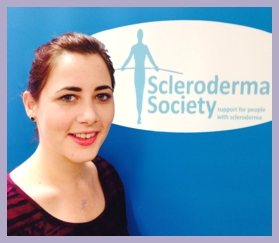 by Chloe Kastoryano, Project Coordinator, Scleroderma Society
by Chloe Kastoryano, Project Coordinator, Scleroderma Society
Amyotrophic lateral sclerosis (ALS) – a condition very few of us had heard of until recently – is suddenly widely known throughout the world. The ice bucket craze that started in America has swept across the pond and now in the UK we’re doing the same. The globe has united behind the #icebucketchallenge, and different countries have put their stamp on the stunt with their own variants – Gaza, for example, is doing the #RubbleBucketChallenge. The surest sign that the movement has reached a critical mass is that a Wikipedia page has even been created. What started as a campaign to raise awareness about ALS rapidly extended to the British ALS charity counterpart – The Motor Neurone Disease Association, and is now helping to bring other rare conditions to the fore. The Scleroderma Society has received donations from the challenge which, just as with ALS donations, will be channelled into research to help find a cure and improve the lives of those with scleroderma. Why has it worked? Quite simply because everyone’s on board. ARMA, whose very structure is built on a multi-agency model, demonstrates the impact we can have when we operate as a united sector. The cynical amongst us might say that the challenge appeals more to people’s vanity than their generosity. However, that’s a difficult view to maintain in the face of the flood of extra donations and awareness for ALS and other rare conditions. In any case, the important thing is that it’s struck a chord with something in people, and is making a real difference – whatever that something might be. A key challenge for the Scleroderma Society – as I am sure, for all rare condition charities – is that we are, and most likely always will be, competing with the ‘popular’ charities. For scleroderma, we don’t yet know what the ‘window of opportunity’ is and diagnosis periods are rarely below a year. In this time the patient will have been seen by a dermatologist, rheumatologist, podiatrist and any other “ist” you can think of, by which point the condition will have developed drastically. Like ALS, scleroderma has no cure, nor is there treatment to reverse its advances. Focus is primarily on slowing the progression of the condition and assisting individuals to self-manage, the aspect of support in which we currently invest our resources. We will be working closely with National Voices in their newest endeavour – the Wellbeing Our Way programme – to identify novel ways to help patients self-manage. We are also extremely excited for ARMA and BJD’s World Summit this October. By speaking with other international organisations we will learn what does and doesn’t work, modify and put our own stamp on interventions to continue to look for ways to improve the lives of those affected. After all, we’re better together.

